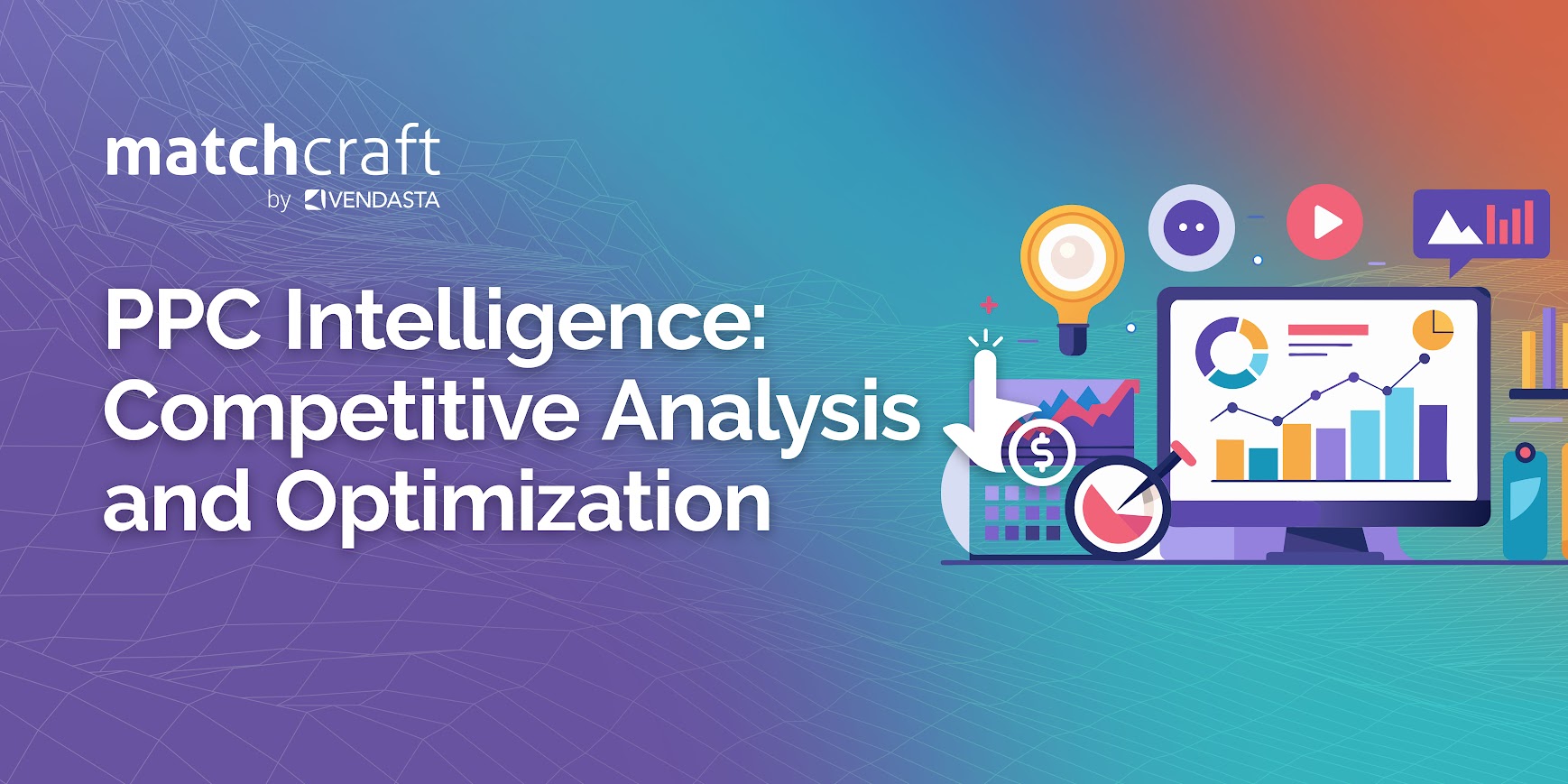Businesses of all sizes are tapping into the power of pay-per-click (PPC) advertising to achieve explosive growth. As competition among brands intensifies, it’s crucial to know what your competitors are up to. Leveraging PPC intelligence allows you to craft strategies that not only keep you in the game but also give you the edge to outpace them.
Curious about how to uncover your competitors’ strategies? In this article, we’ll walk you through the essentials of PPC intelligence, including how to harness data, perform competitive analysis, utilize effective tools, and much more.
What is PPC Intelligence?
PPC intelligence is all about using data and insights to optimize your pay-per-click campaigns. In simpler terms, it’s the process of gathering and analyzing information to make your PPC efforts more effective, efficient, and impactful.
So why is competitive PPC intelligence so important? For starters, it gives you a clear view of what’s happening in the competitive landscape. By analyzing your competitors’ strategies, you can uncover the keywords they’re bidding on, the ad copy that’s driving their clicks, and how their landing pages are converting. This information is gold—it helps you fine-tune your own keywords, craft more compelling ad copy, and design landing pages that get results.
But it doesn’t stop there. PPC intelligence also enables you to continually refine your campaigns. By keeping an eye on performance metrics and industry trends, you can adapt your strategies to stay ahead of the curve. This means you’re not just reacting to what others are doing—you’re proactively positioning your brand for success.
With PPC intelligence, you’re better equipped to stay competitive, improve your Google Ads performance, and ultimately, drive more growth for your business. It’s like having a roadmap that guides you through the complex world of digital advertising, helping you make informed decisions every step of the way.
Understanding the Fundamentals of PPC
Pay-per-click (PPC) is an advertising model where advertisers pay a fee each time someone clicks on their ad. It’s a way of buying visits to your site rather than earning them organically.
Well, it’s easier said than done. To make the most out of PPC, you need to keep an eye on some key metrics.
- Conversion Rate: This tells you how many of those clicks actually lead to a desired action, like a sale or sign-up. A high conversion rate means your ad and landing page are doing their job well.
- Cost Per Conversion (CPC): This is the amount you spend to get a single conversion. Ideally, you want this to be lower than the revenue you earn from each conversion, ensuring a healthy profit margin.
- Click-Through Rate (CTR): This metric shows the percentage of people who click on your ad after seeing it. A high CTR indicates that your ad is relevant and enticing to your audience.
These metrics are more than just numbers—they’re actionable insights that help you fine-tune your campaigns. For example, if your CTR is high but your conversion rate is low, it might be time to rethink your landing page or offer. On the other hand, if your cost per conversion is creeping up, you may need to adjust your PPC bidding strategy or target different keywords.
Understand these key PPC metrics and use them to guide your decisions. They influence everything, from your ad copy to your budget, ensuring that each campaign aligns with your overall business goals.
Leveraging Data for Effective Advertising
Data-driven insights are your best friend when it comes to optimizing your PPC campaigns. They help you refine your targeting strategies, make informed decisions, and ultimately get the best return on your ad spend.
By analyzing your data, you might discover that a particular audience segment is converting at a much higher rate than others. With this insight, you can adjust your targeting to focus more on that segment, ensuring your ads are seen by the people most likely to take action.
And here’s where tools like MatchCraft’s analytics come into play. MatchCraft Platform offers a suite of powerful tools that make gathering and interpreting advertising metrics a breeze. With these tools, you can easily turn mountains of data into clear, actionable insights, helping you make smarter decisions and fine-tune your campaigns for better performance.
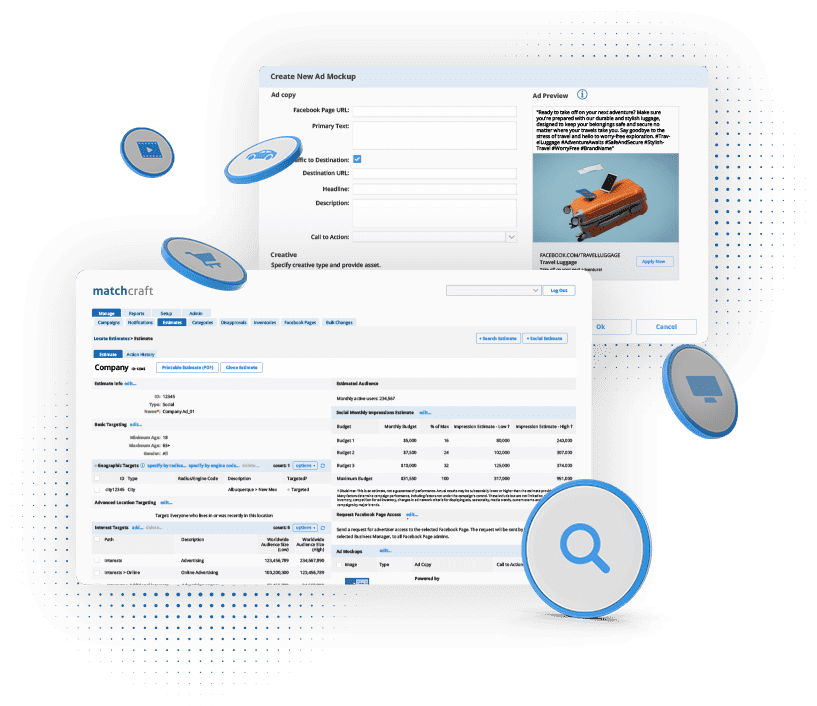
Strategies for Using Competitive PPC Intelligence
PPC advertising is so crowded, and to get ahead, you need more than just a solid campaign. By keeping a close eye on your competition, you can uncover valuable insights that help you outsmart them and drive better results for your own campaigns.
Here are some strategies to help you leverage competitive intelligence in PPC:
Keyword Research
Keyword research is the foundation of any successful PPC campaign, and analyzing your competitors’ keywords can give you a significant edge. By seeing which keywords your competitors are targeting, you can identify gaps in your own strategy and discover new opportunities.
Maybe they’re ranking well for certain high-traffic keywords—this could signal that you should consider bidding on those, too. On the flip side, you might find low-competition keywords they’re missing, allowing you to target these without the high costs of more competitive terms.
Now, let’s talk about long-tail keywords. These are longer, more specific keyword phrases that may have a lower search volume but attract highly targeted traffic. While fewer people may search for this exact phrase, those who do are likely closer to making a purchase.
Landing Page Optimization
Your landing page can make or break your PPC campaign. If a potential customer clicks on your ad but lands on a page that’s confusing, slow, or irrelevant, they’re likely to bounce, costing you that valuable conversion. That’s why optimizing your landing pages is crucial.
Make sure your landing pages:
- Load quickly
- Mobile-friendly
- Provide a great user experience
- Have a clear and compelling call-to-action (CTA)
A/B testing is your best friend here. By creating different versions of your landing page and testing elements like headlines, images, CTAs, and layout, you can see which version performs better and continuously refine your pages for maximum conversion rates.
Ad Copy Enhancement
Ad copy is your chance to make a strong first impression, so it’s worth putting in the effort to get it right. One of the best ways to improve your ad copy is through testing. Create multiple versions of your ads with different headlines, descriptions, and CTAs, then run them simultaneously to see which ones resonate most with your audience.
Using emotional triggers in your ad copy can also significantly increase engagement. People are more likely to click on ads that evoke strong feelings—whether it’s excitement, curiosity, or even a bit of FOMO (fear of missing out).
Finally, consider using dynamic keyword insertion (DKI) to make your ads more relevant. DKI automatically updates your ad copy with the search terms people use, making your ad appear more tailored to their specific needs.
Pro Tip: If you want to enhance your search ads with relevant, compelling ad copy, leverage our ad copy and keyword library, covering over 2500 categories in more than 22 languages.
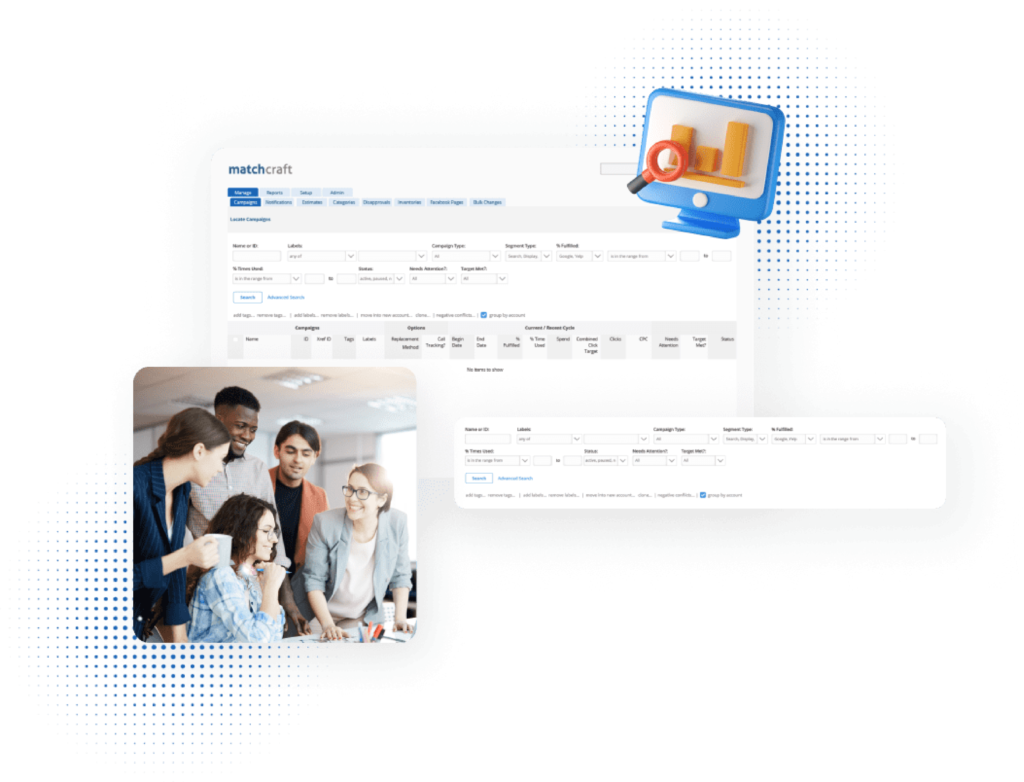
Additional Strategies: Ad Position Monitoring and Quality Score Improvement
Your ad position determines where your ad appears on the search results page, and it’s influenced by factors like your bid amount, quality score, and competition. Monitor and adjust your bids and strategies to ensure your ads appear in prime spots without overspending.
Improving your quality score should also be a top priority. Google uses this metric to determine how relevant and useful your ads are, and a higher quality score can lead to lower costs per click (CPC) and better ad placements.
To boost your quality score:
- Focus on creating relevant ad copy,
- Choose the right keywords
- Ensure your landing pages are closely aligned with your ads.
Implement these strategies, and you’ll be well on your way to creating more effective PPC campaigns that drive better results for your business.
Exploring Pay-Per-Click Tools for Effective PPC Campaigns
Running a successful PPC campaign involves juggling a lot of moving parts—keywords, bids, budgets, ad copy, landing pages, and more. Thankfully, there are plenty of tools out there designed to make your life easier and your campaigns more effective.
Let’s explore some of the best PPC tools that can help you manage your campaigns like a pro.
1. MatchCraft
If you’re a PPC agency managing multiple PPC campaigns across different platforms, integrated PPC management solutions and tools from MatchCraft can be a game-changer. MatchCraft’s platform streamlines the entire process, allowing you to manage campaigns, track performance, and optimize ads all in one place. You can manage all your search ads, social ads, display ads, video ads, and auto ads all under one roof.
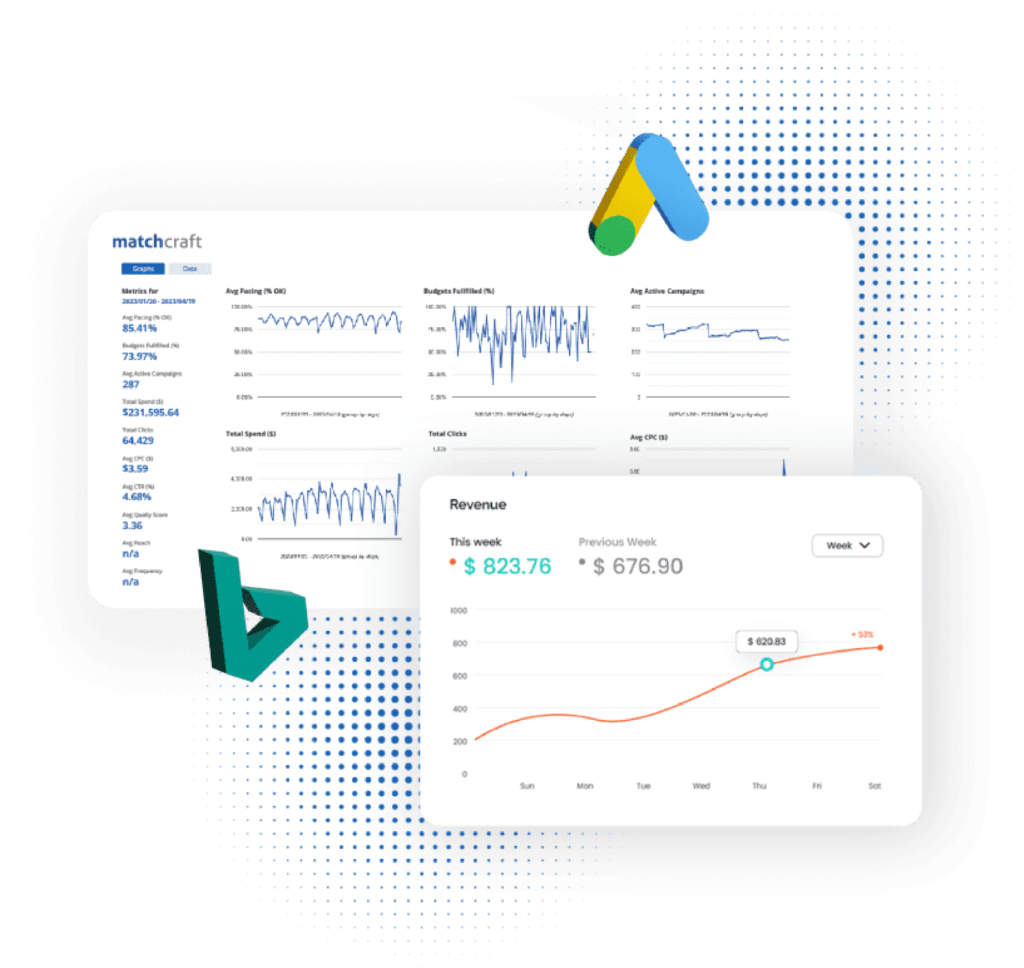
2. Google Ads
Let’s start with the big one—Google Ads. This platform is the go-to for most PPC advertisers because of its massive reach and robust features. With Google Ads, you can create highly targeted campaigns, track performance in real-time, and access a wealth of data to optimize your ads. Plus, it integrates seamlessly with other Google tools like Google Analytics, giving you a comprehensive view of your campaigns.
3. Google Keyword Planner
If keyword research feels overwhelming, Google Keyword Planner is here to help. This tool allows you to discover new keywords, see how they perform, and understand their potential impact on your campaigns. You can also get estimates on bid costs and competition levels, which is invaluable when planning your PPC strategy.
4. SEMrush
SEMrush is a powerhouse for competitive analysis. It offers a suite of tools that help you analyze your competitors’ PPC strategies, uncover their top-performing keywords, and identify gaps in your own campaigns. You can also monitor your own ads, track rankings, and get insights into how to improve your performance. SEMrush is perfect for those who want to dig deep into data and use it to gain a competitive edge.
5. SpyFu
Similar to SEMrush, SpyFu is another excellent tool for spying on your competitors. It lets you see the keywords they’re bidding on, how much they’re spending, and how their ads are performing. This information can help you fine-tune your own strategy, target missed opportunities, and outmaneuver your competitors. SpyFu is particularly useful for small businesses looking to get the most out of their ad budget.
6. Ahrefs
Ahrefs is another versatile tool that, while primarily known for SEO, offers valuable PPC insights. You can analyze keyword competition, track paid search traffic, and explore potential keywords that your competitors might be using. Ahrefs is great for those who want to combine SEO and PPC efforts to create a well-rounded digital marketing strategy.
Integrated platforms like MatchCraft bring everything together, offering a one-stop solution for managing PPC campaigns. These platforms allow you to monitor and optimize your campaigns from a single dashboard, saving time and reducing the complexity of juggling multiple tools.
The Role of PPC Management Software
Managing PPC campaigns can quickly become overwhelming, especially as your campaigns grow in complexity. This is where PPC management software comes into play, acting as a powerful ally in your quest for campaign success.
Automating Reporting and Providing Valuable Insights
One of the biggest advantages of PPC account management software is its ability to automate time-consuming tasks like reporting. Instead of manually pulling data from various platforms, these tools automatically generate reports that provide a clear picture of how your campaigns are performing.
But reporting is just the beginning. PPC management software goes beyond the basics by offering valuable insights that can guide your decision-making. From the vast amounts of data, these tools spot trends, and identify opportunities that you might have missed.
Multi-Platform Reporting and Advanced Analytics
Most businesses today run PPC campaigns across multiple platforms—Google Ads, Facebook Ads, Bing Ads, and more. Managing and optimizing these campaigns separately can be a logistical nightmare. PPC management software simplifies this process by providing multi-platform reporting.
This means you can monitor all your campaigns from a single dashboard, making it easier to compare performance, allocate budgets, and adjust strategies as needed.
In addition to multi-platform reporting, many PPC management tools offer advanced analytics features. These can include detailed performance metrics, conversion tracking, ROI calculations, and even predictive analytics that help you forecast future campaign outcomes.
Need a robust PPC management solution that comes with advanced features? MatchCraft platform is an ideal solution for agencies and businesses. From automating reporting to providing in-depth analytics and multi-platform support, it gives you the tools you need.
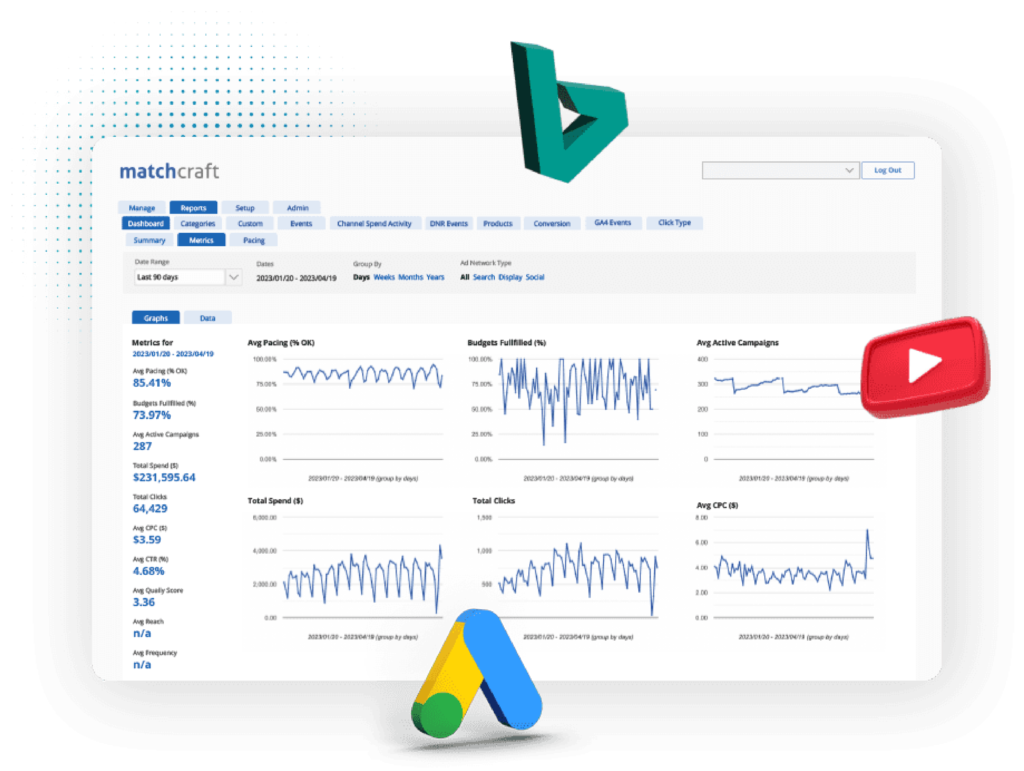
Embracing Data to Ensure PPC Success
Embracing data-driven strategies is the key to unlocking the full potential of your PPC campaigns, ensuring they’re not only effective but also continuously improving.
The Need for Data-Driven Strategies
In PPC management, guessing simply doesn’t cut it. Data-driven strategies allow you to make informed decisions based on real-time insights rather than relying on gut feelings or assumptions.
By analyzing metrics like click-through rates (CTR), conversion rates, and cost-per-click (CPC), you gain a clear understanding of what’s working and what isn’t. This enables you to focus your efforts on strategies that deliver results and adjust those that don’t.
Continuous Data Analysis for Better Decision-Making
PPC campaigns aren’t set-it-and-forget-it; they require ongoing attention and fine-tuning. Continuous data analysis is crucial for keeping your campaigns on track and making necessary adjustments in real-time.
Imagine you’re running a campaign that’s suddenly seeing a drop in performance. Without regular data analysis, you might not catch the decline until it’s too late. However, with continuous monitoring, you can quickly identify the problem—maybe it’s a shift in audience behavior, a rise in competition, or a drop in keyword relevance—and take corrective action.
This proactive approach helps you stay ahead of the curve, ensuring that your campaigns remain effective and profitable.
Pro Tip: To truly harness the power of data, you need the right tools at your disposal. MatchCraft provides a suite of powerful PPC tools for agencies designed to help you track, analyze, and optimize your PPC performance.
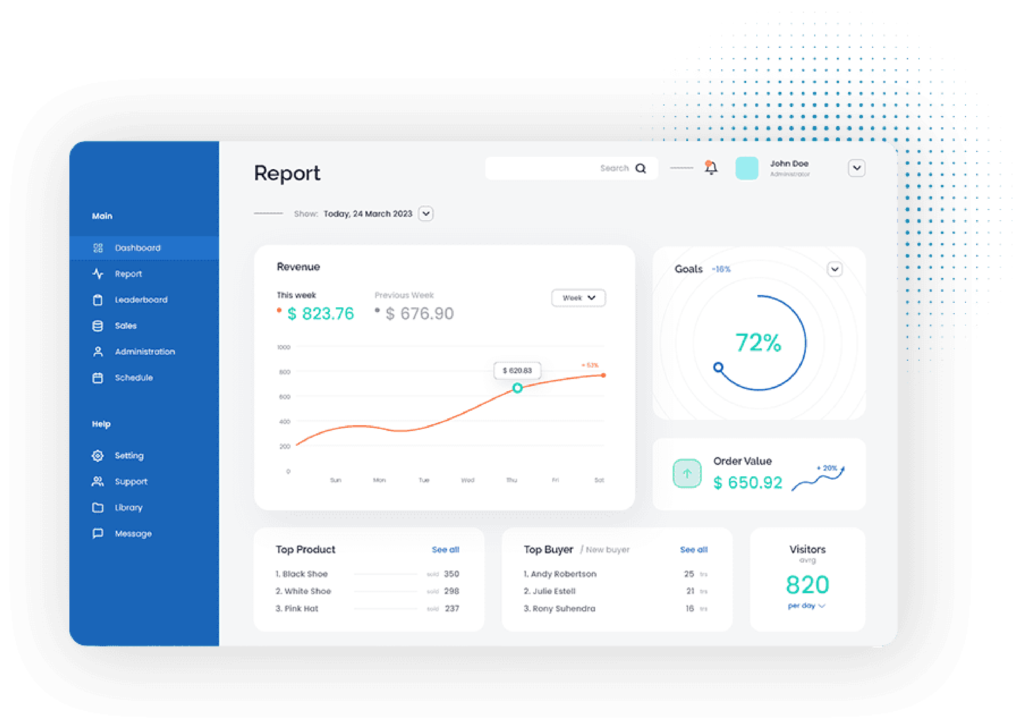
Key Takeaways
As we wrap up, let’s revisit some of the essential points we’ve covered about making the most of your PPC campaigns.
- By embracing the power of competitive PPC intelligence, you can create data-driven strategies that play a key role in the success of your campaigns in the11 dynamic marketplace.
- Enhance your PPC efforts with long-tail keywords for better targeting, A/B testing, landing page optimization, and good Quality Score.
- Leverage top PPC management tools that come with multi-platform reporting, advanced analytics, and seamless campaign management.
Lastly, consider using the MatchCraft platform, which is one of the best solutions for staying ahead in the PPC landscape. To learn more about the solution, schedule a demo today.
__________________________________________________________________________________________________________________________
Author: Maria Selvam Amalraj
